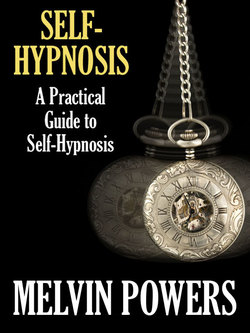Self-Hypnosis

Реклама. ООО «ЛитРес», ИНН: 7719571260.
Оглавление
Melvin Powers. Self-Hypnosis
Отрывок из книги
All of us like to think that our actions and reactions are a result of logical thought processes, but the fact is that suggestion influences our thinking a great deal more than logic. Consciously or unconsciously, our feelings about almost everything are largely molded by ready-made opinions and attitudes fostered by our mass methods of communication. We cannot buy a bar of soap or a filtered cigarette without paying tribute to the impact of suggestion. Right or wrong, most of us place more confidence in what “they” say than we do in our own powers of reason. This is the basic reason why psychiatrists are in short supply. We distrust our own mental processes and want an expert to tell us what to think and feel.
Despite this tendency to adopt our attitudes from others, man has always been dimly aware that he can influence his own destiny by directing his thoughts and actions into constructive channels. He has always, to some extent, known that his mind exerts a powerful influence on his body, and that thoughts can have harmful or helpful effects on his emotional and physical health. The ancient Egyptian sleep temples and the attempts by early physicians to drive evil spirits out of the body were both attempts to influence the body through the mind.
.....
No. Hollywood, California
A popular opinion about hypnosis is that the subject surrenders his will to the hypnotist in the process of being hypnotized. Furthermore, many believe that once the subject is hypnotized, the hypnotist has complete control of the subject and the subject is powerless to resist suggestion. Both beliefs are erroneous. I believe the first misconception comes from seeing techniques where the hypnotist requests the subject to look into his eyes. The hypnotist suggests to the subject that as he continues to look into his eyes he will fall into a deep hypnotic state. This, then, becomes a matter of who can out-stare whom. The subject usually begins to blink his eyes and the hypnotist follows this up with rapid suggestions that the subject’s eyes are becoming watery and heavy and that the subject will fall into a deep hypnotic sleep just as soon as he (the subject) closes his eyes. This procedure gives the impression to the observer that the subject is “willed” to go under hypnosis. It appears that once the hypnotist concentrates or wills sufficiently, the subject succumbs. Actually, the hypnotist in this technique is not looking into the eyes of the subject. He fixes his attention on the bridge of the nose of the subject.
.....